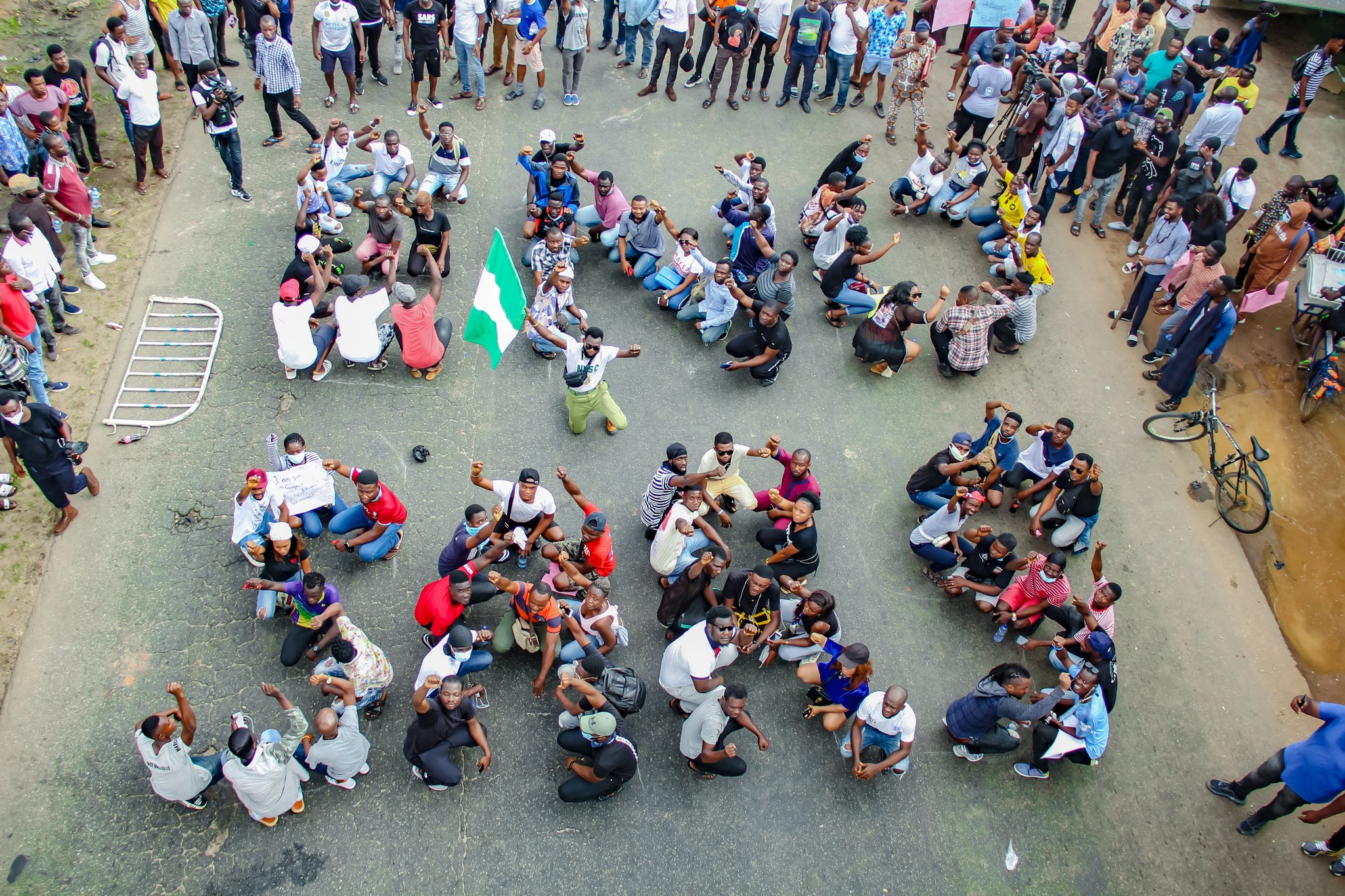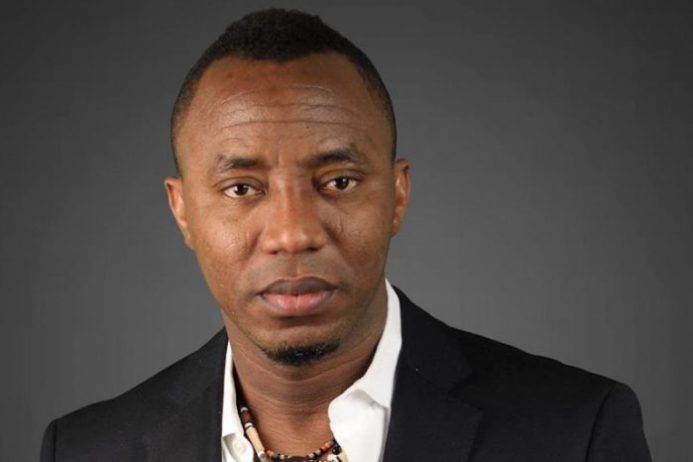OPINION
POLICE, PROTEST POWER, AND NIGERIA’S YOUNG DEMOCRATS

Written by Dr Leena Koni Hoffmann, Associate Fellow, Africa Programme
Nigeria’s youngest citizens are demanding their elected government treat them with dignity and protect their constitutional rights and democratic freedoms of expression, association and assembly, both online and on the streets. President Muhammadu Buhari, a self-proclaimed convert to democratic principles, is facing the most serious test of this conversion.
The #ENDSARS social movement, which has its origins online in 2017, has reignited following reports of the shooting of an unarmed young man by members of Nigeria police’s Special Anti-Robbery Squad (SARS). But peaceful demonstrations against police brutality have been cracked down on with live ammunition by the very same public officials accused of gross heavy handedness.
It is reported that at least 10 people have been killed by police officers since the start of the protests, with dozens arrested and injured. This comes on top of 82 cases of police abuse by SARS documented by Amnesty International between January 2017 and May 2020, including beatings, mock executions, disappearing citizens, waterboarding and sexual violence.
Set up in 1992, SARS appears to operate free of even an illusion of accountability and has become notorious for operating in the same clandestine and violent manner as the criminal groups it was created to combat. But it is merely the tip of the spear of Nigeria’s violent and predatory police force.
Vested interests in the status quo
Endemically corrupt, underfunded and understaffed, the federally controlled Nigeria Police Force (NPF) of 371,800 officers is being outpaced by the manifold internal security challenges of a country with an estimated population of more than 200 million.
Nigeria’s police to population ratio is drastically below the United Nations’ standard of 1:450 while, in 2018, Nigeria’s Police Service Commission (PSC) complained 150,000 policemen were attached to VIPs and private individuals.
Buhari’s assent to a new Police Bill in September, finally replacing the old colonial Police Act of 1943, is an indication of how poorly-served the Nigerian public has been. But the Act contains no timeline of implementation or provisions for the operationalization of units such as SARS.
Sections of the Nigeria police system have a vested interest in maintaining the status quo. Senior ranking officers are known to maintain a perverse bribery pyramid which requires that poorly paid rank-and-file officers transfer bribes extorted from citizens up the chain of command. The police have rejigged and rebranded anti-robbery, kidnapping and violent crime units, but they are resistant to systemic change.
Even after Nigeria’s Inspector General of Police (IGP) Mohammed Adamu announced the dissolution of SARS – for at least the fourth time in four years – protesters were being dispersed with teargas, water cannons and even live bullets. This ‘crackdown mentality’ reveals much about the Nigerian state’s deep-rooted paranoia, especially facing a youthful citizenry who are finding their voice.
The generational divide in the #ENDSARS movement is clear, as many of those mobilizing, organizing, marching and crowdfunding are in their 20s and 30s. Social media is a natural interface and incubator for their opinions and activism, and they have little patience for Nigeria’s respectability politics.
The protests have snowballed into an outlet for latent anger and frustration, as Nigeria has the largest number of young people in poverty in the world, as well as the most food insecure households in West Africa. With a median age of 18, more than half of Nigeria’s population is under 30 years of age, and young people overwhelmingly suffer from Nigeria’s high rates of unemployment.
According to the country’s national bureau of statistics, while 27.1 per cent of the workforce is unemployed, 40.8 per cent of young people aged 15-24 and 30.8 per cent of 25 – 34 years are out of work. If Nigeria’s unemployed youth were its own country, it would be larger than Tunisia or Belgium.
For young Nigeria, the outlook is bleak as the failure of the government to improve economic conditions and expand opportunities for its youngest citizens has been worsened by the pandemic, and Buhari is now on track to preside over two recessions. And there is no lack of talent or effort among the youth – they are known for being innovative and entrepreneurial, with many achieving global success in competitive industries such as technology, telecommunications and entertainment.
No reform without justice and accountability
Root and branch police reform has been on the cards for a long time but too many opportunities have been missed, so the situation is untenably entrenched. A rushed rebranding of SARS or redeployment of its personnel will not meet any standards of accountability – there must be a full reckoning with the past and a sharp bend towards justice.
Reviewing the recruitment, assessment, training and remuneration of the police force is critical, but there needs to be radical transparency and independent oversight. In the immediate term, there should be an impartial and publicly-transparent judicial panel of inquiry into human rights violations, approved by credible human rights organizations and independent from both law enforcement and the executive.
This panel should have the power to expeditiously audit SARS detention facilities and sequester and examine all video and documentary evidence, as well as to summon and question all relevant individuals regardless of their level of seniority, hold livestreamed and televised public hearings, and make reparation to victims and their families.
Investigations by the panel should be timebound, findings made public, and a public register set up for those confirmed to have been killed by SARS actions, with prosecutions and punishments to follow. Police reform cannot succeed without consequences for perpetrators of abuse.
In addition, the international community must ensure compliance under the UN mandate on the ‘responsibility to protect’ (R2P). Nigeria’s international partners – particularly the UK and EU – should put in place visa and financial restrictions on any public official whose orders or actions perpetuate police abuse. Washington should also extend its current visa and travel restrictions on individuals involved in corruption and electoral violence to those implicated in SARS’ human rights abuses and police violence.
Nigeria has become more and more hostile, dangerous, and unfulfilling for its young people, a major setback for the country’s first truly democratic generation. Buhari has converted to democracy in his twilight years, but the young activists in these protests were born into it, and the awareness of democratic rights and freedoms are stronger for this generation than the memory of repressive dictatorships.
The question now is whether the Nigerian government is prepared to engage with such a switched-on, rights-conscious and active citizenry. Nigerians and the rest of the world are watching how President Buhari handles this moment.



















